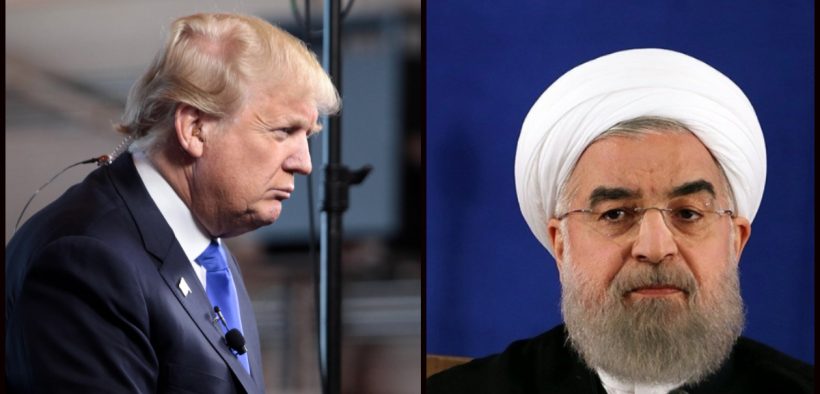US, Iran Rhetoric Reaches Fever Pitch After New Sanctions

“The strategy of maximum pressure is not designed to induce negotiations, but rather to push Iran away from the negotiating table while triggering further Iranian provocations that could serve as a pretext for war.”
The war of words between Iran and the Trump administration heated up on Tuesday, as President Trump called statements by Iranian officials “ignorant and insulting” and threatened “obliteration” for any “attack by Iran on anything American.”
“Iran’s very ignorant and insulting statement, put out today, only shows that they do not understand reality. Any attack by Iran on anything American will be met with great and overwhelming force. In some areas, overwhelming will mean obliteration. No more John Kerry & Obama!” The president wrote in a tweet.
The White House unveiled new sanctions targeting Iranian higher-ups like Supreme Leader Ali Khamenei on Monday, prompting disparaging remarks from Iranian officials like President Hassan Rouhani, who said “the White House is afflicted by retardation and does not know what to do,” according to the Associated Press.
“You sanction the foreign minister simultaneously with a request for talks?” Rouhani said in a televised speech.
Iran also warned the new personalized sanctions could result in the total closure of diplomatic channels.
“The useless sanctioning of Islamic Revolution Supreme Leader (Khamenei) and the commander of Iranian diplomacy means closing the doors of diplomacy by the U.S.′ desperate administration,” said Iranian Foreign Ministry spokesman Abbas Mousavi. “Trump’s government is annihilating all the established international mechanisms for keeping peace and security in the world.”
Secretary of State Mike Pompeo, who was in Afghanistan for an unannounced stop on Tuesday, called Rouhani’s remark’s “immature and childish” and said the Trump administration will remain “steadfast” in the economic pressure campaign the White House is waging against the Islamic Republic of Iran.
Pompeo wrote a 2018 op-ed alleging Ayatollah Khamenei has access to as much as $95 billion, which the Secretary of State asserts is “used as a slush fund for the Islamic Revolutionary Guard Corps.” Trump said the Supreme Leader was “ultimately responsible for the hostile conduct of the regime,” but critics argue increasing personalized sanctions at a time of extreme tension will only serve to lessen the possibility of negotiation.
“The strategy of maximum pressure,” said Jamal Abdi, president of the National Iranian American Council (NIAC), “is not designed to induce negotiations, but rather to push Iran away from the negotiating table while triggering further Iranian provocations that could serve as a pretext for war.”
Tensions between the U.S. and Iran have steadily intensified since the president withdrew from the Iran Nuclear Deal and reimposed harsh economic sanctions on the Islamic Republic. In the past month, the likelihood of full-scale war has amplified, as oil tankers attacked by uncertain assailants off the coast of Iran prompted the White House to send a new round of US soldiers to the Middle East.
On June 17, Iran announced it would increase its uranium production in violation of the nuclear deal and is set to surpass its threshold on Thursday.
The new round of sanctions comes after Iran shot down a U.S. drone last week, which the country claims violated its air space. The president approved retaliatory airstrikes last week before pulling out at the last minute, an episode critics argue demonstrates the need for immediate de-escalation in order to avert catastrophic war.
“The operation was underway in its early stages when it was called off,” according to the New York Times. “Planes were in the air and ships were in position.”
Iranian Foreign Minister Javad Zarif is among the many political commentators who view the president’s Iran policy as highly influenced by Secretary of State Pompeo and National Security John Bolton, both of whom have long lobbied for aggressive action against the Islamic Republic. Zarif referred to Bolton and Pompeo as the “B-Team” on Monday, and argued they are more excited by warmongering than serving genuine U.S. interests.
Trump “is 100% right that the U.S. military has no business in the Persian Gulf. Removal of its forces is fully in line with interests of U.S. and the world. But it’s now clear that the #B_Team is not concerned with U.S. interests—they despise diplomacy, and thirst for war,” tweeted the Iranian foreign minister.











